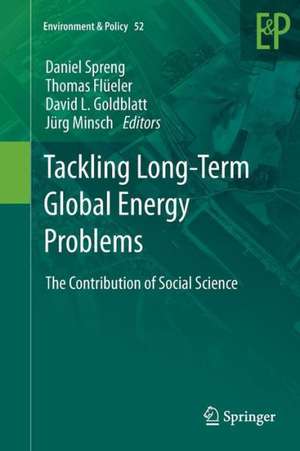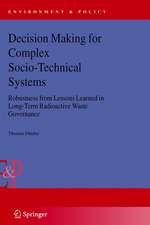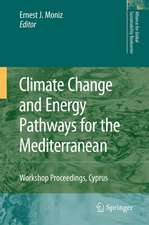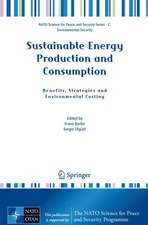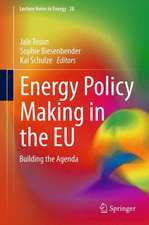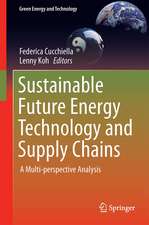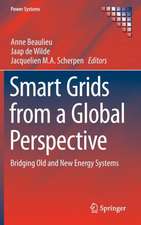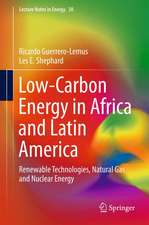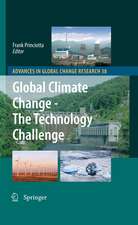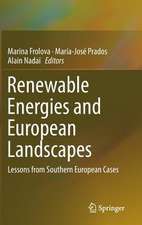Tackling Long-Term Global Energy Problems: The Contribution of Social Science: Environment & Policy, cartea 52
Editat de Daniel Spreng, Thomas Flüeler, David L. Goldblatt, Jürg Minschen Limba Engleză Paperback – 24 feb 2014
| Toate formatele și edițiile | Preț | Express |
|---|---|---|
| Paperback (1) | 1219.63 lei 6-8 săpt. | |
| SPRINGER NETHERLANDS – 24 feb 2014 | 1219.63 lei 6-8 săpt. | |
| Hardback (1) | 1224.36 lei 6-8 săpt. | |
| SPRINGER NETHERLANDS – 3 ian 2012 | 1224.36 lei 6-8 săpt. |
Din seria Environment & Policy
- 18%
 Preț: 783.68 lei
Preț: 783.68 lei - 15%
 Preț: 641.20 lei
Preț: 641.20 lei -
 Preț: 402.77 lei
Preț: 402.77 lei -
 Preț: 407.01 lei
Preț: 407.01 lei - 15%
 Preț: 641.85 lei
Preț: 641.85 lei - 18%
 Preț: 955.08 lei
Preț: 955.08 lei - 18%
 Preț: 944.82 lei
Preț: 944.82 lei - 15%
 Preț: 650.19 lei
Preț: 650.19 lei - 18%
 Preț: 952.89 lei
Preț: 952.89 lei - 15%
 Preț: 642.68 lei
Preț: 642.68 lei - 18%
 Preț: 1227.36 lei
Preț: 1227.36 lei - 18%
 Preț: 1226.90 lei
Preț: 1226.90 lei - 15%
 Preț: 642.18 lei
Preț: 642.18 lei - 15%
 Preț: 641.53 lei
Preț: 641.53 lei - 15%
 Preț: 643.48 lei
Preț: 643.48 lei -
 Preț: 385.25 lei
Preț: 385.25 lei - 20%
 Preț: 335.52 lei
Preț: 335.52 lei - 15%
 Preț: 640.88 lei
Preț: 640.88 lei - 15%
 Preț: 638.43 lei
Preț: 638.43 lei - 15%
 Preț: 636.12 lei
Preț: 636.12 lei - 18%
 Preț: 941.50 lei
Preț: 941.50 lei - 18%
 Preț: 946.55 lei
Preț: 946.55 lei - 18%
 Preț: 945.30 lei
Preț: 945.30 lei - 18%
 Preț: 948.29 lei
Preț: 948.29 lei - 18%
 Preț: 959.19 lei
Preț: 959.19 lei - 18%
 Preț: 957.44 lei
Preț: 957.44 lei - 18%
 Preț: 955.70 lei
Preț: 955.70 lei - 15%
 Preț: 639.90 lei
Preț: 639.90 lei
Preț: 1219.63 lei
Preț vechi: 1487.36 lei
-18% Nou
Puncte Express: 1829
Preț estimativ în valută:
233.37€ • 244.32$ • 193.10£
233.37€ • 244.32$ • 193.10£
Carte tipărită la comandă
Livrare economică 05-19 aprilie
Preluare comenzi: 021 569.72.76
Specificații
ISBN-13: 9789401782593
ISBN-10: 9401782598
Pagini: 364
Ilustrații: XXVIII, 336 p.
Dimensiuni: 155 x 235 x 19 mm
Greutate: 0.5 kg
Ediția:2012
Editura: SPRINGER NETHERLANDS
Colecția Springer
Seria Environment & Policy
Locul publicării:Dordrecht, Netherlands
ISBN-10: 9401782598
Pagini: 364
Ilustrații: XXVIII, 336 p.
Dimensiuni: 155 x 235 x 19 mm
Greutate: 0.5 kg
Ediția:2012
Editura: SPRINGER NETHERLANDS
Colecția Springer
Seria Environment & Policy
Locul publicării:Dordrecht, Netherlands
Public țintă
ResearchCuprins
PART I.- 1. Introduction.- 2. Energy-Related Challenges.- 3. The Indispensable Role of Social Sciences in Energy Research.- PART II: Invited Contributions.- 4. What About Social Science and Interdisciplinarity? A 10-year Content Analysis of Energy Policy.- 5. Towards an Integrative Framework For Energy Transitions of Households in Developing Countries.- 6. A Socio-Cultural Analysis of Changing Household Electricity Consumption in India.- 7. The Changing Context for Efforts to Avoid the ‘Curse of Oil’.- 8. Contributions of Economics and Ethics to an Assessment of Emissions Trading.- 9. No Smooth, Managed Pathway to Sustainable Energy Systems – Politics, Materiality and Visions For Wind Turbine and Biogas Technology.- 10. Technical Fixes Under Surveillance – CCS and Lessons Learned from the Governance of Long-Term Radioactive Waste Managements.- 11. Learning From the Transdisciplinary Case Study Approach: A Functional-Dynamic Approach to Collaboration Among Diverse Actors in Applied Energy Settings.- 12. Lessons from the Invited Contributions.- 13. Synthesis: Research Perspectives.- PART III.- 14. Lessons for Problem-Solving Energy Research in the Social Sciences.- Name Index.- Subject Index.
Textul de pe ultima copertă
Most contemporary energy-related problems are social as much as they are technological. Yet typically, only scholars in a narrow range of social science disciplines engage in energy research.
This book makes a case for a multidisciplinary and transdisciplinary approach to energy research—one that brings more of the social sciences to bear. Featuring eight studies from across the spectrum of the social sciences, each applying multiple disciplines to one or more energy-related problems, the book demonstrates the strong analytical and policy-making potential of such a broadened perspective. Case studies include: energy transitions of households in developing countries, the ‘curse of oil’, politics and visions for renewables, economics and ethics in emissions trading, and carbon capture and storage.
The authors characterise the most pressing global energy problems, discuss the role of social science in analysing and addressing them and offer recommendations for research agendas.
Academics as well as practitioners working in the energy field will find the contents relevant and thought-provoking.
‘A forceful argument for the indispensible role of the social sciences in energy research and why the present asymmetry with the natural sciences/engineering has to be overcome in addressing the enormous complexity of the problems confronting us. A must-read for anyone interested in how academic research and civil society will either succeed or fail – together.’
Helga Nowotny, President, European Research Council
‘This book presents a crucial plea to all involved in energy problems. To scientists and engineers it shows that energy systems that are not well embedded in society will not function properly and sustainably. And for social scientists this book highlights how crucially important the scientific and technical dimensions of energy problems are for the social cohesion ofsociety.’
Wiebe E. Bijker, Professor of Technology & Society, University of Maastricht, The Netherlands
This book makes a case for a multidisciplinary and transdisciplinary approach to energy research—one that brings more of the social sciences to bear. Featuring eight studies from across the spectrum of the social sciences, each applying multiple disciplines to one or more energy-related problems, the book demonstrates the strong analytical and policy-making potential of such a broadened perspective. Case studies include: energy transitions of households in developing countries, the ‘curse of oil’, politics and visions for renewables, economics and ethics in emissions trading, and carbon capture and storage.
The authors characterise the most pressing global energy problems, discuss the role of social science in analysing and addressing them and offer recommendations for research agendas.
Academics as well as practitioners working in the energy field will find the contents relevant and thought-provoking.
‘A forceful argument for the indispensible role of the social sciences in energy research and why the present asymmetry with the natural sciences/engineering has to be overcome in addressing the enormous complexity of the problems confronting us. A must-read for anyone interested in how academic research and civil society will either succeed or fail – together.’
Helga Nowotny, President, European Research Council
‘This book presents a crucial plea to all involved in energy problems. To scientists and engineers it shows that energy systems that are not well embedded in society will not function properly and sustainably. And for social scientists this book highlights how crucially important the scientific and technical dimensions of energy problems are for the social cohesion ofsociety.’
Wiebe E. Bijker, Professor of Technology & Society, University of Maastricht, The Netherlands
Caracteristici
Provides the most comprehensive treatment to date of the role played in energy research by the social sciences Includes contributions notable for their multidisciplinary rigour and relevance to contemporary energy dilemmas Features unique graphical syntheses of research findings Supplies researchers with a solid foundation in designing their agendas
